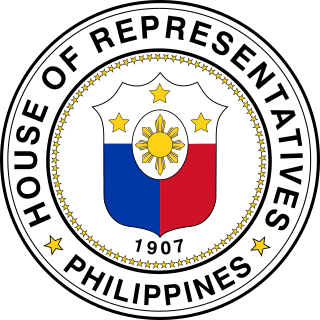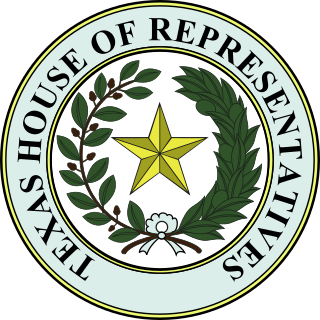
The House of Representatives of the Philippines is the lower house of Congress, the bicameral legislature of the Philippines, with the Senate of the Philippines as the upper house. The lower house is usually called Congress, although the term collectively refers to both houses.

The Maryland General Assembly is the state legislature of the U.S. state of Maryland that convenes within the State House in Annapolis. It is a bicameral body: the upper chamber, the Maryland Senate, has 47 representatives, and the lower chamber, the Maryland House of Delegates, has 141 representatives. Members of both houses serve four-year terms. Each house elects its own officers, judges the qualifications and election of its own members, establishes rules for the conduct of its business, and may punish or expel its own members.

The Georgia General Assembly is the state legislature of the U.S. state of Georgia. It is bicameral, consisting of the Senate and the House of Representatives.

The Texas House of Representatives is the lower house of the bicameral Texas Legislature. It consists of 150 members who are elected from single-member districts for two-year terms. There are no term limits. The House meets at the State Capitol in Austin.

The Michigan House of Representatives is the lower house of the Michigan Legislature. There are 110 members, each of whom is elected from constituencies having approximately 77,000 to 91,000 residents, based on population figures from the 2020 U.S. Census. Its composition, powers and duties are established in Article IV of the Michigan Constitution.
Congressional staff are employees of the United States Congress or individual members of Congress. The position first developed in the late 19th century, and it expanded significantly during the 20th century. Staffers may work with individual members of Congress, or they may be associated with committees or other organizations that support Congress.

Thomas Jeffery Cole is the U.S. representative for Oklahoma's 4th congressional district, serving since 2003. He is a member of the Republican Party and serves as the chairman of the House Rules Committee. During his tenure as the chairman of the National Republican Congressional Committee (NRCC) from 2006 to 2008, he was the fourth-ranking Republican in the House.

The government of Alabama is organized under the provisions of the 1901 Constitution of Alabama, the lengthiest constitution of any political entity in the world. Like other states within the United States, Alabama's government is divided into executive, judicial, and legislative branches. Also like any other state, these three branches serve a specific purpose in terms of power.

The Alabama State House of Representatives is the lower house of the Alabama Legislature, the state legislature of state of Alabama. The House is composed of 105 members representing an equal number of districts, with each constituency containing at least 42,380 citizens. There are no term limits in the House. The House is also one of the five lower houses of state legislatures in the United States that is elected every four years. Other lower houses, including the United States House of Representatives, are elected for a two-year term.

The Utah State Legislature is the state legislature of the U.S. state of Utah. It is a bicameral body, comprising the Utah House of Representatives, with 75 state representatives, and the Utah Senate, with 29 state senators. There are no term limits for either chamber.

The speaker of the House of Representatives of the Philippines, more popularly known as the House speaker, is the presiding officer and the highest-ranking official of the lower house of Congress, the House of Representatives, as well as the fourth-highest official of the government of the Philippines.

The president of the Senate of the Philippines is the presiding officer and the highest-ranking official of the Senate of the Philippines, and third highest and most powerful official in the government of the Philippines. They are elected by the entire body to be their leader. The Senate president is second in the line of succession to the presidency, behind only the vice president and ahead of the speaker of the House of Representatives.
Title 2 of the United States Code outlines the role of Congress in the United States Code.
U.S. Senate Appropriations Subcommittee on Legislative Branch is one of twelve subcommittees of the U.S. Senate Committee on Appropriations. The United States Senate Committee on Appropriations has joint jurisdiction with the United States House Committee on Appropriations over all appropriations bills in the United States Congress. Each committee has 12 matching subcommittees, each of which is tasked with working on one of the twelve annual regular appropriations bills.
The Parliamentary Counsel Office is New Zealand's law drafting office. It drafts New Zealand Government Bills and Legislative Instruments. It also publishes all New Zealand Bills, Acts, and Legislative Instruments in print and on the New Zealand Legislation website.

The United States House of Representatives is the lower chamber of the United States Congress, with the Senate being the upper chamber. Together, they comprise the national bicameral legislature of the United States.

Procedures of the United States Congress are established ways of doing legislative business. Congress has two-year terms with one session each year. There are rules and procedures, often complex, which guide how it converts ideas for legislation into laws.

Katherine Marlea Clark is an American lawyer and politician who has served as the U.S. representative for Massachusetts's 5th congressional district since 2013. She has been House Minority Whip since 2023 and was Assistant House Democratic Leader from 2021 to 2023. Her district includes many of Boston's northern and western satellite cities and suburbs, such as Medford, Framingham, Woburn, Waltham, and her home city of Revere. Clark was a member of the Massachusetts House of Representatives from 2008 to 2011 and the Massachusetts Senate from 2011 to 2013.
The Philippine presidential line of succession defines who becomes or acts as president upon the incapacity, death, resignation, or removal from office of a sitting president or a president-elect.
The Office of Parliamentary Counsel (OPC) is an Australian Commonwealth government agency established under the Parliamentary Counsel Act 1970 (Cth) within the Commonwealth Attorney-General's portfolio. OPC drafts all government Bills that are introduced into the federal Parliament, legislative instruments made by the Governor-General, and a range of other delegated legislation. It also manages the Federal Register of Legislation to provide access to authorised, up-to-date versions of Commonwealth laws.












